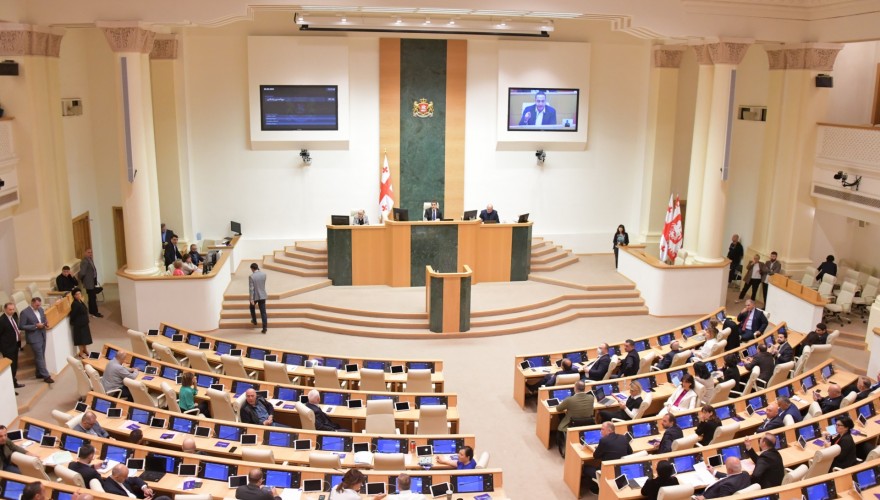On July 10, Transparency International Georgia published a report assessing the performance of the Parliament in 2023. Over the last year, the report finds, the Parliament has become a “closed institution.” The report names the growing institutional inaccessibility of the Parliament for both journalists and representatives of civil society organizations and the lack of transparency when releasing public information, particularly concerning developments in 2023. What is more, for the first time in the last ten years, the Parliament did not respond to Transparency International’s request for public information on the number of speeches delivered by MPs, details on disciplinary actions taken against MPs, and the activities of the parliamentary committees.
The report recognizes the importance of the Parliament’s work for Georgia’s path toward European integration. Specifically, it points out the protests against the foreign agents law in February 2023 as playing “a crucial role in the country achieving candidate status for EU membership.” Further, it notes that only three of the 12 recommendations for Georgia’s EU accession issued by the European Commission in June 2022 have been implemented.
Transparency International-Georgia welcomes the passage of legislation regarding personal data protection, as well as the amendments to the anti-corruption law mandating prosecutors to disclose their asset declarations. However, the report negatively evaluates the proposed initiatives concerning “the preliminary prohibition on temporary constructions during gatherings and demonstrations, modifications to broadcasting regulations concerning the management of hate speech, and amendments to accountability and oversight provisions in the Rules of Procedure.”
Overview of activities by MPs in 2023
- The Parliament authorized 1,836,033.17 GEL in funding for overseas business trips by 98 MPs in 2023
- Of the MPs serving in the parliamentary majority, Irma Zavradashvili (Georgian Dream) submitted the highest number of bills—105. Of all opposition MPs, the most prolific was Aleksandre Rakviashvili (Girchi), who initiated a total of 74 bills.
- The most frequent absentee from the majority was Eliso Bolkvadze (Georgian Dream), who did not take part in 13 plenary sessions. Of the opposition, Cezar Chocheli (UNM) missed 23 plenary sessions. Of those missing the Parliament’s committee sessions without a valid reason, the majority MP Mariam Lashkhi (Georgian Dream) did not attend ten plenary sessions, while the opposition MP Giorgi Godabrelidze (UNM) had 16 unexcused absences.
- Opposition MPs submitted the most questions to stakeholders in 2023 (2,920), while MPs from the parliamentary majority sent only 77 questions to ministers and accountable persons. Overall, there was a decrease in the number of parliamentary questions submitted compared to previous years.
Recommendations
The report stresses the importance of establishing a specialized parliamentary body for the oversight of the activities of the security sector, in particular the opaque State Security Service. It advises that the parliamentary majority “should not obstruct the opposition’s use of oversight mechanisms through artificial barriers” regarding enforcing the recommended oversight procedures. The report notes that in 2023, “791 unanswered parliamentary questions were submitted by the opposition, constituting 27% of their overall inquiries. Conversely, only five questions posed by the majority remained unanswered, representing a mere 6% of their total questions.”
Further, Transparency International recommends that MPs consult more with the public throughout the legislative process, stressing the importance of extensive discussions and expert involvement concerning decisions made on “significant national matters” in the Parliament. Moreover, the report stresses that “the Parliament should review legislative proposals promptly and allow the authors to present their opinions to the committee,” pointing out that “bills should only be expedited or prolonged in their deliberation in exceptional cases.” In 2023, 122 laws were fast-tracked by the Parliament.
Lastly, the report encourages the Parliament to refrain from obstructing the participation of media and civil society organizations in the legislative process through “legislative changes or violations of existing rules,” further noting the importance of the timely release of public information to ensure institutional transparency and accountability. “Access to the Parliament,” Transparency International states, “should not be unreasonably restricted for media and civil society representatives.”
Also Read:
